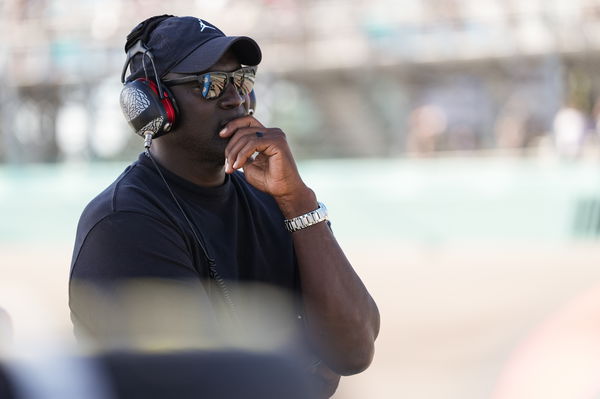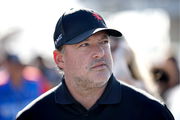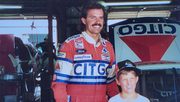
via Imago
Oct 27, 2024; Homestead, Florida, USA; 23XI team owner Michael Jordan watches during the Straight Talk Wireless 400 at Homestead-Miami Speedway. Mandatory Credit: Jasen Vinlove-Imagn Images

via Imago
Oct 27, 2024; Homestead, Florida, USA; 23XI team owner Michael Jordan watches during the Straight Talk Wireless 400 at Homestead-Miami Speedway. Mandatory Credit: Jasen Vinlove-Imagn Images
The legal battlefield in NASCAR has shifted gears, with 23XI Racing, co-owned by basketball legend Michael Jordan and driver Denny Hamlin, filing an antitrust lawsuit against the sport’s governing body. While lawsuits are hardly uncharted territory for major leagues in sports, this one strikes at the heart of NASCAR’s operations—its charter system.
Despite the ongoing litigation, NASCAR President Steve Phelps remains resolute, doubling down on his support for the charter system in a recent interview with The Athletic. But his comments, carefully balanced between optimism and pragmatism, shed light on a divided landscape within the sport.
ADVERTISEMENT
Article continues below this ad
Phelps defends charter system amid lawsuit
During the interview, Phelps emphasized that the charter system, while not without its flaws, has been instrumental in creating a sustainable business model for NASCAR teams. “We are wed to the charter system,” he stated firmly. “It creates healthy teams. Overall, as we think about 2024 and these 13 teams, we immediately went out and had discussions with every single team about how we’re going to collaborate together.”
The lawsuit filed by 23XI Racing challenges aspects of this very system, accusing NASCAR of anti-competitive practices. However, Phelps sees the system as a cornerstone for the sport’s future. He acknowledged that not every aspect of the charter agreement was perfect for either side, saying, “There are things in there they really like, and there are some things in there that they don’t like, or they don’t like as well. And you could say the same thing about our negotiation…we negotiated in good faith with our race teams to find a balance that was going to help the sport move forward positively.”
23XI’s argument was based on the little time NASCAR gave for teams to sign the document. There was less than 24 hours to review the paperwork entirely. However, the team felt it was too short of a time to bargain for the changes they wished to see. Nevertheless, they formally declined to sign the agreement unless the changes they requested were made. Michael Jordan and Co. weren’t alone in this frustration. Legends of the sport like Richard Childress and Rick Hendrick both admitted they signed under a lot of pressure.

via Imago
Syndication: Detroit Free Press Hendrick Motorsports owner Rick Hendrick watches the action during the FireKeepers Casino 400 on Sunday, Aug. 6, 2023. , EDITORIAL USE ONLY PUBLICATIONxINxGERxSUIxAUTxONLY Copyright: xKirthmonxF.xDozierx 21191748
Phelps added, “To me, that’s the start of something new and special that I believe is going to work. And when I mean work, I mean it’s going to work for the race teams because it’ll make them more profitable, it’ll help them be more marketable, and because of those things, it’s going to help the sport grow. I’m super bullish on that.”
The 2024 charter agreement solidified partnerships with 13 teams controlling 32 charters, though not all 36 have been signed. Despite this, Phelps remains optimistic, calling the system “a good thing for NASCAR and the growth of this sport.” His stance on the charter system is underpinned by its perceived benefits, including profitability, marketability, and growth opportunities for teams. According to Phelps, the agreement works similarly to F1’s Concorde Agreement. It guarantees team a share of the revenue and their inclusion in the competition for a certain period.
“No one likes to be in litigation, but that’s where we are. We’re defending ourselves vigorously,” he added, signaling NASCAR’s unwavering commitment to its current structure.
Trending
Phelps sees talent flourishing in a competitive era
Amid the legal wrangling, Phelps took time to celebrate the on-track competitiveness that defined the 2024 season. From a record number of different winners to standout performances from underdog teams, the NASCAR Cup Series demonstrated unparalleled parity this year. “I think if you’re going to go from the top of the grid to the back of the grid, this is the most competitive that NASCAR has ever been,” Phelps said, highlighting the unique stories that emerged throughout the season. He pointed to Carson Hocevar as a prime example of what the current system allows.
ADVERTISEMENT
Article continues below this ad
Driving for Spire Motorsports, a team that historically struggled to break into the top 10, Hocevar delivered several impressive performances, particularly during the season’s latter stages. “Take a kid like Carson Hocevar, who ran really well at many, many, many races this year, particularly down the stretch,” Phelps said. “That’s with a Spire Motorsports team that historically has not performed with top 10s or competing for top fives. That’s just a great success story.”
According to Phelps, these stories are a direct result of the charter system and NASCAR’s ongoing efforts to level the playing field. While powerhouse teams like Hendrick Motorsports, Penske Racing, and Joe Gibbs Racing remain dominant, smaller teams and emerging drivers are finding ways to make their mark.
The 2024 season also saw NASCAR reaching out to fans in new ways, from hosting high-profile events in innovative locations like Chicago and Mexico City to announcing a groundbreaking media deal with a whole host of media networks. These changes, Phelps argued, are part of a broader effort to ensure the sport’s long-term health. As NASCAR heads into 2025, the tension between innovation and tradition, collaboration and litigation, remains palpable. The antitrust lawsuit from 23XI Racing and Front Row Motorsports represents a significant challenge for NASCAR’s leadership. But with Phelps at the helm, the organization appears committed to its vision for the sport, anchored by the charter system.
ADVERTISEMENT
Article continues below this ad
For fans, teams, and stakeholders, the coming seasons will be pivotal. Can NASCAR strike the delicate balance required to maintain its growth while addressing internal dissent? If Phelps’ bullish outlook is any indication, he’s betting the charter system will not only survive but thrive. Only time will tell if the gamble pays off.
ADVERTISEMENT
ADVERTISEMENT
ADVERTISEMENT
ADVERTISEMENT





